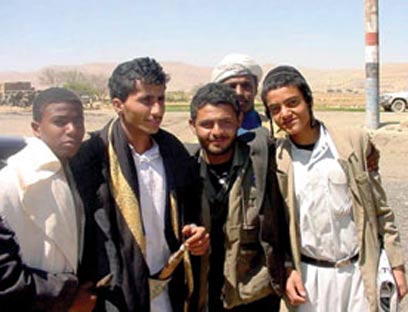With an issue so enormous and morally laden as the Holocaust, it is important that we are self-critical in our approach to discussing the matter, and that we constantly ask ourselves whether we learned the right lessons from this historical tragedy, and whether our words and actions effectively honor its victims. Just as every Jewish person is commanded to view himself as though he, personally, had been redeemed from Egypt, every Jew should feel a personal sorrow and connection with the Holocaust. Every Jew should feel some sense of personal obligation to prevent a holocaust from ever happening again. Finally, the Jewish people should strive to encourage the non-Jews of the world to similarly feel a personal sense of sorrow towards the inhumanity of the Holocaust, and a personal sense of responsibility to ensure that it never happens again. The common theme of these goals is that Jews must view the Holocaust personally, but also, as something that affects and affirms the "oneness" of all humanity.
I believe that a great flaw in the way that many Jews confront this issue lies in the fact that, in their focus on the personal dimension of the Holocaust, they have largely lost sight of its universal aspects. In what has become the standard discourse, rather than communicating a message of unity and commonality between Jews and non-Jews, the message has almost invariably become one of distinction and difference. Such an approach not only diminishes the empathy that non-Jews have towards Jews, but it deprives the rest of the world of a critical moral lesson regarding the universality of injustice and suffering. This approach also has the potential of creating divisions between Jews of European ancestry, whose ancestors bore the brunt of the Holocaust, and Jews from other ethnic backgrounds, who may have different cultural and social experiences to bring to the table. This is not the best way to honor the victims of the Holocaust.
Israel and the Holocaust
One of the great ways in which the conventional wisdom regarding the Holocaust has become frankly detrimental is in the Holocaust's perceived role in the creation of Israel. It is true that Israel was established by the remnant of pre-Holocaust European Jewry, along with some earlier pioneers. It is also inarguable that centuries of oppression against Jews, culminating with the Holocaust, served as a powerful motivating force for the founding fathers and early leaders of the state. Clearly, modern Israel was created in part as a refuge for Jews who survived the Holocaust, and were fleeing oppression. However, it is one thing to say that centuries of oppression and genocide spurred the Jewish people to actualize the re-establishment of Jewish sovereignty in Israel, and quite another to say that the historical suffering of the Jewish people is necessary to prove that Israel has "a right to exist".
The very notion of externally questioning a nation's "right to exist", is suspect. History shows that every nation's "right to exist" is justified completely by the fact of its existence. No nation is required to prove that its people were historically oppressed, or nearly exterminated, in order to gain "legitimacy". Yet, many Jews seem to honestly believe that the Holocaust is essential for not only the world's acceptance of Israel as a sovereign state, but also for their support of the beleaguered country. For example, an Israeli columnist states in an op ed piece for the November 15, 2006 Jerusalem Post, entitled Anti-Semite and Jew:
“I believe the history of anti-Semitism gives Jews the right to a state. . .”
This is somewhat like saying, "I have a right to experience the warmth and light of the Sun, because I 've been locked in a cave all my life." No other people resort to such tortured logic to justify their right to self-determination, yet for Jews, this is received as an unexceptional statement of the "obvious". It should therefore come as no surprise when the anti-Semitic enemies of Israel seize upon this theme, of our own creation, to attack its weaknesses.
The fact that the common Jewish approach to the Holocaust has become a great weapon in the hands of Israel's anti-Semitic enemies, is demonstrated by the obsessive rhetoric of the Iranian government under the leadership of Mahmoud Ahmadinejad. As stated by a Journalist for the BBC on December 16, 2006, the approach of Holocaust denial "has all the simplicity of a mathematical proof"; if Israel is built upon the moral and diplomatic foundation of the the Holocaust, then denying the existence of the Holocaust, and causing others to doubt it, strikes a mortal wound to the Jewish state. The very fact that Iran even thought to sponsor and hold a conference on the Holocaust -- a European phenomenon, which has no direct relevance to Iran -- shows how the conventional wisdom, rather than confirming Israel's legitimacy in the eyes of the world, has had the unintended consequence of encouraging even more vituperative attacks against Israel, the Jewish people, and the deceased victims of Nazi genocide. Iranian Foreign Minister, Manouchehr Mottaki clearly summed up the reason for the conference, as follows:
“If the official version of the Holocaust is thrown into doubt, then the identity and nature of Israel will be thrown into doubt. And if, during this review, it is proved that the Holocaust was a historical reality, then what is the reason for the Muslim people of the region and the Palestinians having to pay the cost of the Nazis' crimes?"
But contrary to Mottaki's underlying assumption, the desire to re-establish Jewish sovereignty in Israel was born the moment the sovereignty was lost, nearly two thousand years ago. The state was not given to the Jews as a form or "restitution" for the Holocaust by the powers of Europe, it was created through the convictions of its founding fathers, and brought into existence by the courage and sacrifices of its people. Many Jews fought and died to bring the state into existence and many Arabs fought and died to try to prevent it. It was a competition for land and resources, and the Jews won. Yet, the Foreign Minister's words seem to resonate. They resonate because perhaps Jews do not have a complete confidence in the righteousness of their cause. Therefore, rather than allowing the victims of the Nazis to rest in peace, we have somehow felt the need to resurrect them and press them into service defending a nation which they never knew, and in reality, did not die for.
The Holocaust happened --it is a fact. But Israel would have a right to exist, even if it had not happened. If we know this, and believe it, there should be no reason to invite the anti-Semites of this world to challenge this historical event, or to desecrate the memories of the souls who perished.
The Holocaust and our Common Bond with all of Humanity
Between 1915 and 1917, well over one million Armenian men, women and children were slaughtered in Turkey. This was the first modern example of genocide. Every form of indignity was inflicted upon the Armenians, forced deportations, starvation, mass executions, beatings, and the copious use of rape and sexual torture as a means of suppressing and destroying them as a people. Although the atrocities were known to the world from press accounts, no nation did anything to stop it. Adolf Hitler is credited with saying, in contemplation of his "final solution" against the Jews, "after all who remembers the slaughter of the Armenians?" There are also, unfortunately, tragically, many other examples of genocide in modern history -- Biafra, Darfur, Rwanda, Bosnia; just to name a few. There were millions of victims of the trans-Atlantic African slave trade. Nearly one quarter of a million Roma (Gypsy) perished along side the Jewish victims of the Holocaust. The victims of all of these historical atrocities were made in the image of God, and died simply for who they were. Moreover, unspeakable oppression against Dalits, and other "untouchables" continues to this very day, the victims also, God's children, and their degradation and shame, grave and unforgivable sins.
All of these abuses and atrocities are well-documented. And efforts at denial are as offensive and morally repugnant as they are unpersuasive. Yet the Jewish community seems reticent to join hands with these people who have similarly suffered. The fact that we have not built significant bridges to these non-Jewish communities, and established bonds of shared experience, seems to be a tremendous waste of opportunity, and a failure to put Tikkun Olam into practice. I would suggest that rather than focusing on every incident of anti-Semitism around the world, and attempting to pressure countries to criminalize Holocaust denial and prosecute every reprobate Holocaust denier, we would be far better served by cultivating relationships with the world's other historical victims of oppression, and joining forces with them in apposing great evil.
Jewish suffering is uniquely Jewish, but the concept of "suffering" is the province of humanity. Jews, although we belong to a specific covenant that defines our existence, are nevertheless still a part of the family of man. Giving honor to the victims of oppression, and acknowledging the injustice that was done to other people, does not diminish from the honor that we accord to our own.
We must continue to honor the Jewish Victims of the Holocaust and cherish their memories. But rather than telling the non-Jews of the world that our victims have suffered more then theirs, our suffering is greater than theirs, and our oppressors were more evil than theirs, should we not, instead be saying : "Our victims suffered, just like yours, our suffering was great, just as yours was, and our oppressors were evil, just as yours were"? Should we not say to all those who have been oppressed: "We stand with you in your struggles, and we would hope that you too, will stand with us"?
Our attachment to the Land of Israel begins and ends with the Torah. Although our Covenant makes us unique, it certainly does not make us any less worthy of freedom and dignity than all other people. The sages long ago acknowledged that returning to our Land is supreme among the mitzvot. Therefore, rather than saying that we deserve sovereignty and statehood because we have been more oppressed than all other people, we must have the moral clarity to understand, believe, and state without equivocation, that we deserve these things, in our land, because we are just like all other people.
Finally, we must understand that Judaism is not a religion of misery and suffering, but rather it is a religion of redemption. By proclaiming the redemptive nature of Judaism, we ensure that the victims of the Nazis have not died in vain, and we create a greater bond with all of humanity.
It seems to me that this is a better way to honor the six million.










No comments:
Post a Comment